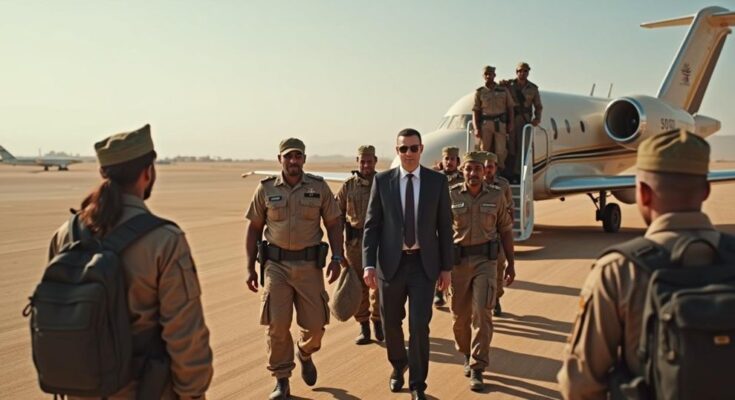The African Union delegation, led by Mauritanian President Mohamed Ould Ghazouani, left Libya after the eastern authorities denied their visit, following Ghazouani’s refusal of a request from eastern Prime Minister Osama Hammad. Hammad’s controversial trip to Mauritania involved seeking access to Libyan assets and potential support regarding foreign militia activities in the region.
The delegation from the African Union, led by Mauritanian President and AU Chairman Mohamed Ould Ghazouani, concluded its visit to Tripoli, Libya, after a brief stay lasting less than one day. Notably, the delegation did not proceed to the eastern region of Libya due to a refusal from local authorities to accept the visit. Political analyst Salah Al-Bakoush indicated that this rejection stemmed from President Ghazouani’s prior dismissal of a request made by Osama Hammad, the Prime Minister of the competing eastern government, during Hammad’s controversial trip to Mauritania. This request involved permitting access to Libyan assets in Mauritania, specifically the Chinguitty Bank, previously known as the Libyan Bank in Nouakchott. In return for the request, Hammad purportedly offered Mauritania potential assistance regarding the Wagner forces, who reportedly cross into Mauritanian territory and are believed to support rebel leaders from Mali. Hammad’s visit to Mauritania in late August was characterized by pro-government media as official, prompting Mauritania to issue a clarification through its embassy in Tripoli. The embassy stated, “The meeting of the President of Mauritania with the Libyan guest took place at the request of the latter,” referring to Hammad. This diplomatic incident underscores the complexities of Libya’s political landscape, with competing authorities and international diplomatic engagements influencing relationships and alliances.
The situation in Libya is characterized by a divided political landscape, with multiple authorities vying for power. The eastern region of Libya operates under a parallel government, which has often clashed with the UN-recognized Government of National Unity in Tripoli. The African Union has been actively engaged in mediating discussions and facilitating dialogue among Libyan factions. The role of external influences, including foreign militias and financial assets, further complicates these dynamics, as local authorities seek to gain leverage through international relations.
In summary, the African Union delegation’s hasty departure from Libya highlights the persistent tensions between the eastern and western authorities. The controversial request by Prime Minister Osama Hammad to access Libyan assets demonstrates the ongoing struggles over financial control and influence in the region. Such diplomatic engagements are essential to understanding the broader context of Libya’s fragmented political environment and the difficulties encountered in achieving unity among its factions.
Original Source: libyaobserver.ly




